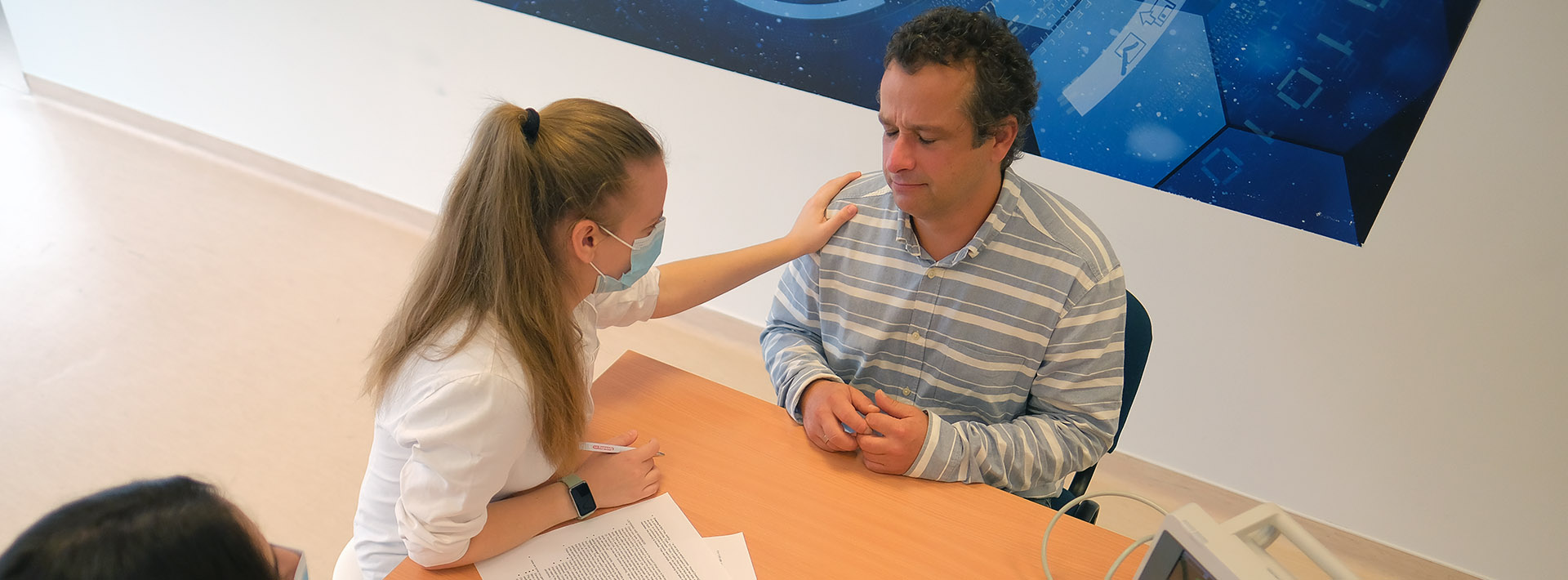Data
Official data in SubjectManager for the following academic year: 2024-2025
Course director
-
Bellyeiné Pozsgai Éva
assistant professor,
Department of Primary Health Care -
Number of hours/semester
lectures: 0 hours
practices: 0 hours
seminars: 12 hours
total of: 12 hours
Subject data
- Code of subject: OXF-GOO-h-T
- 1 kredit
- General Medicine
- Optional modul
- spring
ODP-BPR-T finished
Exam course:Course headcount limitations
min. 5 – max. 25
Topic
The course is a continuation of Medical Communication in Practice 1. The aim of the course is to encourage students to practise appropriate communication in emotionally challenging, difficult doctor-patient situations.
The first part focuses on managing emotional responses of patients and relatives. Students receive theoretical educational material prior to the classes, therefore, application of the communication models through experience-based approach can enable interactive participation of students with simulated patients in medical encounters.
1.Sensitizations of the students to emotional expressions of patients happen with the ‘4-ears model’.
2. Applying the NURSE-model students become equipped with communication techniques to deal with emotions adequately, thus, they can learn to support the emotional needs of patients.
3.Practice based on the application of the CALM-model facilitates learning de-escalation of anger.
The second part of the course focuses on breaking bad news and discussing difficult issues, with the aim of practising the elements of the SPIKES protocol through role-playing. Students are able to practice building trust with patients and relatives, breaking bad news honestly and openly, recognising and managing the patient's and their own emotional reactions to the delivery of bad news, and applying useful verbal and non-verbal elements of information delivery through case-based exercises.
The course was developed in collaboration with the Department of Behavioural Sciences, the Department of Languages for Biomedical Purposes and Communication and the Department of Primary Health Care.
Lectures
Practices
Seminars
- 1. Consultation Class 1. Dealing with Patient's emotions and breaking bad news. (Dr. Éva Pozsgay, Dr. Ágnes Csikós, Katalin Eklicsné Dr. Lepenye, István Hartung, Dr. Szilvia Heim, Dr. Ildikó Bán, Judit Szalai-Szolcsányi, Dr. Nóra Frank, Dr. Dániel Kürthy, Judit Szalai- Szolcsányi, Dr. Boróka Gács, Dr. Gergely Csaba) - FELKÉRT OKTATÓ
- 2. Consultation Class 2. Dealing with emotional reactions and breaking bad news. (Katalin Eklicsné Dr. Lepenye, István Hartung, Dr. Szilvia Heim, Dr. Ildikó Bán, Judit Szalai-SzolcsányiDr. Ágnes Csikós, Dr. Éva Pozsgay, Dr. Nóra Frank, Dr. Dániel Kürthy, Judit Szalai- Szolcsányi, Dr. Boróka Gács, Dr. Gergely Csaba) - FELKÉRT OKTATÓ
- 3. Dealing with patients’ and family members’ emotional reactions (angry, anxious, depressed…etc patients). Empathic communication. (Katalin Eklicsné Dr. Lepenye, István Hartung, Dr. Szilvia Heim, Dr. Ildikó Bán, Judit Szalai-Szolcsányi) - FELKÉRT OKTATÓ
...
- 4. Dealing with patients’ and family members’ emotional reactions (angry, anxious, depressed…etc patients). Empathic communication. (Katalin Eklicsné Dr. Lepenye, István Hartung, Dr. Szilvia Heim, Dr. Ildikó Bán, Judit Szalai-Szolcsányi) - FELKÉRT OKTATÓ
- 5. Dealing with patients’ and family members’ emotional reactions (angry, anxious, depressed…etc patients). Empathic communication. (Katalin Eklicsné Dr. Lepenye, István Hartung, Dr. Szilvia Heim, Dr. Ildikó Bán, Judit Szalai-Szolcsányi) - FELKÉRT OKTATÓ
- 6. Dealing with patients’ and family members’ emotional reactions (angry, anxious, depressed…etc patients). Empathic communication. (Katalin Eklicsné Dr. Lepenye, István Hartung, Dr. Szilvia Heim, Dr. Ildikó Bán, Judit Szalai-Szolcsányi) - FELKÉRT OKTATÓ
- 7. Dealing with patients’ and family members’ emotional reactions (angry, anxious, depressed…etc patients). Empathic communication. (Katalin Eklicsné Dr. Lepenye, István Hartung, Dr. Szilvia Heim, Dr. Ildikó Bán, Judit Szalai-Szolcsányi) - FELKÉRT OKTATÓ
- 8. Communicating bad news. Communication with family members. (Dr. Ágnes Csikós, Dr. Éva Pozsgay, Dr. Nóra Frank, Dr. Dániel Kürthy, Judit Szalai- Szolcsányi, Dr. Boróka Gács, Dr. Gergely Csaba) - FELKÉRT OKTATÓ
...
- 9. Communicating bad news. Communication with family members. (Dr. Ágnes Csikós, Dr. Éva Pozsgay, Dr. Nóra Frank, Dr. Dániel Kürthy, Judit Szalai- Szolcsányi, Dr. Boróka Gács, Dr. Gergely Csaba) - FELKÉRT OKTATÓ
- 10. Communicating bad news. Communication with family members. (Dr. Ágnes Csikós, Dr. Éva Pozsgay, Dr. Nóra Frank, Dr. Dániel Kürthy, Judit Szalai- Szolcsányi, Dr. Boróka Gács, Dr. Gergely Csaba) - FELKÉRT OKTATÓ
- 11. Communicating bad news. Communication with family members. (Dr. Ágnes Csikós, Dr. Éva Pozsgay, Dr. Nóra Frank, Dr. Dániel Kürthy, Judit Szalai- Szolcsányi, Dr. Boróka Gács, Dr. Gergely Csaba) - FELKÉRT OKTATÓ
- 12. Communicating bad news. Communication with family members. (Dr. Ágnes Csikós, Dr. Éva Pozsgay, Dr. Nóra Frank, Dr. Dániel Kürthy, Judit Szalai- Szolcsányi, Dr. Boróka Gács, Dr. Gergely Csaba) - FELKÉRT OKTATÓ
Reading material
Obligatory literature
nincs
Literature developed by the Department
Dealing with Patient’s emotions and Breaking bad news - Notes for medical students
Notes
-
Recommended literature
Conditions for acceptance of the semester
Active participation in classes
Mid-term exams
Written test
Making up for missed classes
-
Exam topics/questions
-
Examiners
- Bellyeiné Pozsgai Éva
Instructor / tutor of practices and seminars
- Bán Ildikó
- Bellyeiné Pozsgai Éva
- Csaba Gergely József
- Csikós Ágnes Erika
- Eklicsné Lepenye Katalin
- Frank Nóra
- Gács Boróka
- Hartung István
- Heim Szilvia Mária
- Kürthy Dániel
- Szalai-Szolcsányi Judit
